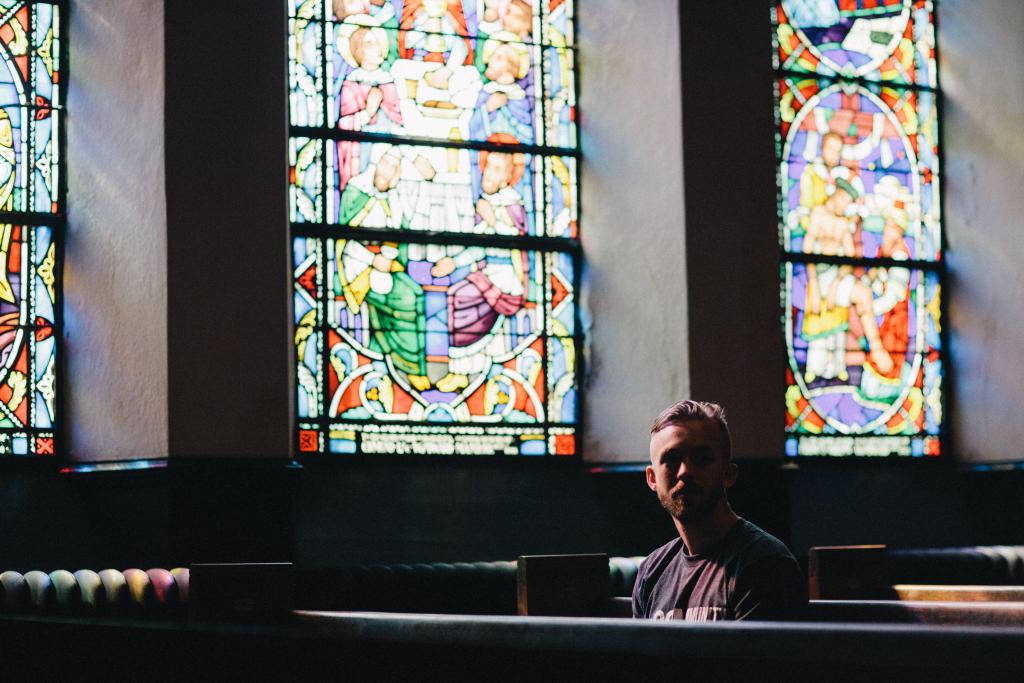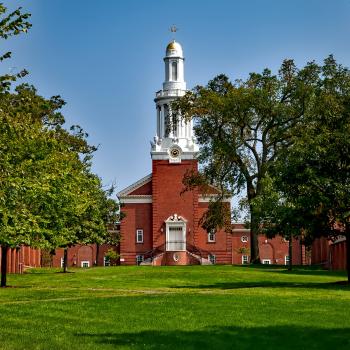
Starting a blog is always difficult and so I thought that it would be best to begin this one with an inaugurating post that addressed the elephant in the room. I am of course referring to the fact that I am, unlike the other bloggers here on Patheos, a Seventh-day Adventist.¹
For most, that name will sound oddly strange. What is an “Adventist”? Glad you asked. One short answer is that they are usually considered to be another conservative church, typically grouped in surveys with Evangelicals. An even shorter explanation is that, to put it quite simply: they’re weird. Really, truly, oddly… weird.
Now, let me explain. When I say weird, I mean it. Here’s five examples illustrating my point:
- On the political scale, we’re weird. Although we are considered a quite conservative denomination and Ben Carson (who ran as a Republican presidential candidate) is part of our church, the majority of Adventists in the United States, according to Pew Research, surprisingly vote Democrat. As a denomination, we’re officially in favor of Creationism (even helping to originally kickstart it within America), but according to Pew again, 33% of Adventists support Evolution.² Government sanctioned Gay Marriage likewise, while disapproved of by the denomination officially, finds some surprising support amongst Adventists according to surveys.
- On the philosophical side of things, we are stranger yet. Though born in Modernism and holding to a belief in “Biblical Truth,” Adventists also pre-empted Postmodernism with an idea called “Present Truth,” a theological conviction we’ve historically held that simply put, states that God’s revelation of truth is ongoing and as such, no one actually has the whole truth nor can, since truth itself is always unfolding. Take this quote from Ellen White, one of the three founders of Adventism, as an example:
“If our youth are seeking to educate themselves to be worker in God’s cause, they… are not to make up their minds that the whole truth has been unfolded… If they entrench themselves in the belief that the whole truth has been revealed they will be in danger…”
Counsels to Writers and Editors, p. 51
It is hard to imagine a more odd sentiment for a “conservative” church to make then to warn that its youth should not be taught to believe that the “whole truth” has been unfolded. This same idea is also found in the 28 Fundamental Beliefs that Adventists have. Although it looks like a “creed” of sorts, it actually has a disclaimer that the Nicene Creed never included. It states, as a preamble, that: “Revision of these statements may be expected at a General Conference Session when the church is led by the Holy Spirit to a fuller understanding of Bible truth or finds better language in which to express the teachings of God’s Holy Word.”
- On the theological spectrum, it gets even more odd. Take the Bible for instance. Just like every other conservative denomination, we trumpet the terms “Sola Scriptura” and proclaim the Bible as our only primary creed. Yet, in spite of that, we have been and firmly are set against the doctrine of inerancy: the belief that the Bible is without any human fingerprints. Adventists hold the Bible to be the supreme authority but also consider it to be a human response to God, guided by the Holy Spirit but not controlled. Take this quote that illustrates this view so plainly, again from Ellen White (Adventists tend to quote her a lot, much like Lutherans quote Martin Luther):
Everything human is imperfect… The Bible is written by inspired men, but it is not God’s mode of thought and expression. It is that of humanity. God, as a writer, is not represented. Men will often say such an expression is not like God. But God has not put Himself in words, in logic, in rhetoric, on trial in the Bible. The writers of the Bible were God’s penmen, not His pen.
Selected Messages Vol. 1, p. 21
- On the Pastoral side of things, we’re super weird as far as conservative churches go! To begin with, we were founded in-part by a young woman (Ellen White) who went on to become the theological giant of the church (in spite of the fact that she lacked a complete formal education). She rose in respect and was listed as an ordained minister of the church for years, giving sermons to large groups of men regularly. As a result of her influence and role in our history, the Adventist church officially today employs male and female pastors. In China, for example, the number of female ministers has been exponentially increasing.
- In terms of social activism, we are really odd. We have had a long history of activism for Social Justice causes. We were in favor of Prohibition (and worked with activists for it) primarily because we were against the abuse of wives by their husbands and early on, naively imagined, like so many other Americans, that alcohol was the cause of such abuse. We were, from our earliest days, firmly set against slavery and made it a test of membership to fight it. We taught a form of “Proto-Liberation Theology,” arguing that Christ “was poor, and he sympathizes with the poor, the discarded, the oppressed and declares that every insult shown to them is as if shown to himself.”³ With particular regard to the plight of Blacks, our Church taught an early form of Gustavo Gutierrez’ “Preferential Option,” noting that:
“The Lord’s eye is upon all his creatures, He loves them all, and makes no difference between White and Black, except that he has a special tender pity for those [such as the Black Community] who are called to bear a greater burden than others.”
The Southern Work, p. 11
Early on, between 1890-1910, our theological leaders supported reparations, arguing that “the American nation owes a debt” to that community, a debt that “God has ordained.” As Ellen White warned: “Those who have taken no active part in enforcing slavery upon [the Black Community] are not relieved from the responsibility of making special efforts to remove, as far as possible, the sure result of their enslavement.”° And so, at the level of theory, our church has always felt a call to be “co-laborers with Christ” in both ministry in the church and outside.
And of course, some of our strangest beliefs are found in the very name we carry.
The name “Seventh-day Adventist” refers to two of our distinctive beliefs: the observance of the Sabbath on the seventh day, Saturday and the expectation of a soon-coming return of Jesus. The Sabbath part is an essential aspect of Adventist identity. We believe that God gave the Sabbath to signify that humanity was created for more than just working and commerce, and as such, we value and respect that in the Bible, God specifically asks that Saturday be reserved for rest (it’s in the 10 Commandments!). We’re not alone in this regard. Other denominations such as the Seventh-day Baptists (a far older denomination that taught us about this practice originally) and even popular bestselling Christian authors have shared the same practice (former mega-church pastor Rob Bell, for instance, celebrates the Sabbath on Saturday according to his previous book How To Be Here).
The other part of our name, the “Adventist” part, speaks to our shared conviction that Jesus is coming back again. Now, at first, that might not sound unique. In truth, it’s not unique anymore. Most Christians who are Protestant expect Jesus to return. It’s sort of become a standard expectation. However, over a hundred years ago in the 1800’s, most Protestants did NOT believe that Jesus was imminently returning and instead were convinced that humans would have to first create heaven on earth (as a Christian utopia) before Christ would come to start his kingdom and reign (there’s some fascinating history books about this that I recommend you should read). As a result, Seventh-day Adventists, going against this idea, believed and proclaimed that Jesus would return without human effort beforehand. If you haven’t noticed, that placed a pretty strong emphasis on Grace in our church, an emphasis that climaxed in a famous denominational meeting in 1888 (but that’s another story for another time).
So how did such a strange denomination begin? To make a very short history lesson: Seventh-day Adventism is a Protestant denomination that formed over a hundred and fifty years ago after the Millerite movement fell apart in the years following the late 1840s. In the years following our official formation in the 1860’s, we were heavily involved in the medical field, spoke out against slavery during the Civil War and promoted social causes such as fighting against the abuse of women. Today, the church has nearly 20 million members worldwide and what started as a small group of people seeking answers to their despair has blossomed into a worldwide church that makes a tangible difference in the lives of millions across the globe.
So let me point out one more “weird” fact about Adventists: for a church that most would think (even those within it) that we are a “conservative” church, we have historically been against conservative thinking. Take for example the following quote that is representative of Historical Adventism:
“As real spiritual life declines, it has ever been the tendency to cease to advance in the knowledge of the truth. Men rest satisfied with the light already received from God’s Word, and discourage any further investigation of the Scriptures. They become conservative, and seek to avoid discussion.”
Testimonies for the Church Vol. 5, p. 706
In conclusion, and this must be clarified (in case you haven’t already noticed): Adventists are not the same as Evangelicals. Our disagreements with inerancy, conservative thinking and our belief in progressive revelation put us at odds with each other.
Yet, and this is important to note, we’re also not technically Progressives either (or liberals, for that matter). Although we see the Bible as a human production, we uphold it as authoritative, inspired by God and wrestle with it. We do not believe a priori that our own ideas, if they disagree with the Bible, are better (instead assuming the opposite usually). Although we have a history of political activism and pursuing social justice causes, we also have strong cautions on becoming involved in politics for fear of the politics co-opting the faith (a problem that has plagued many liberal congregations). Although we believe in a progressive revelation, we don’t believe that such progress or “present truth” means that we can dismiss all of our past beliefs (assuming that the Holy Spirit is leading us), which means that we are reluctant to leave something behind in search of something new. And more on a note of despair than positive contrast: although we have women pastors, we are still strangely enough debating in our church whether we should ordain those female pastors and treat them the same as men.
If there is a middle ground between the two theological poles of Evangelicalism and Progressive Christianity, I would argue that our denomination is theoretically sitting there.
We are an odd mix of different ideas. As one Baptist friend put it, we’re like a half burnt piece of toast (still delicious, but different). And of course, as one might expect, not everyone in the church realizes this.
You will find Adventists that are as Evangelical as they come (and they will be horrified and shocked by how I describe us in this post), and likewise you will find Adventists who are as liberal as any Episcopalian (though they are far smaller in number). There are Adventists who act firmly as Protestants in resting their foundation on the Bible, and there are also some quite strange Adventists who treat one of our church founders and theological voices as an authority equal to the Bible (this is not an approved Adventist belief, but one which persists with some of the more cultish members).
There is a great deal of difference between the Adventist church “in theory” and what it is “in practice,” but then again, that’s true for every denomination and certainly is true for Christianity as a whole. Our own church leaders constantly criticized ourselves for not doing enough or not acting as we should. The struggle is real my friends and most of us are involved in it to some degree or another. Why else would you be reading this blog post?
In the end, the Adventist church has many unique aspects about it (far more than what I mentioned here). It is, as one can clearly see, a weird church. It obviously looks odd to find a denomination that finds itself distinctly in the center of what is often a polarized mess of theological debates. And so clearly, if the church is odd, one can guess that so am I (and so is this new blog). And yet, that center-stage position of my church background is a positive oddity that I hope will benefit this blog.
When searching for a home on Patheos, I didn’t believe that I quite fit the Evangelical section because I’m not technically one of them. The above post illustrates that well enough. Yet, I suspect most typical Adventists would have expected to find an Adventist blog in that section. Yet, I am not. Instead, I am in the Progressive Christian section. The problem is: I also don’t truly belong here either. Adventism, while progressive in its own right, does not comfortably fit in a liberal mainline church. Perhaps though, due to Adventism’s historic dislike of conservatism and its promotion of progressive revelation, this section is the closest fit possible.
So what’s the end goal of this? How will I be different than others here? Well, I seek to be a voice not only for those in my own church, but also for all Christians (and truth seekers) who wish to find a middle path amongst the extremes they find. I am dedicated to using it as a platform to explore the book that is central to Christianity and my personal faith: the Bible. I want to explore the Word of God in new ways that will equally surprise the Dogmatic Atheist, the Rationalist Progressive and the Grounded Evangelical alike.
This blog welcomes Evangelicals and Progressives (and everyone in-between and outside) and seeks to create a conversation, rather than an echo chamber. I hope you will join me in that endeavor, not only here, but in real life as well.
Welcome to Biblical Literacy. Let’s start exploring, shall we?
Endnotes
¹ Ryan Bell was a Seventh-day Adventist when he joined Patheos, but started his blog as an experiment in atheism.
² Jared Wright, “Super Tuesday Notes: More Adventists are Democrats than Republicans,” Spectrum Magazine (March, 1 2016). http://spectrummagazine.org/article/2016/03/01/super-tuesday-notes-more-adventists-are-democrats-republicans
³ Ellen White, Manuscript 6, 1891.
° Ellen White, The Southern Work, p. 54.
 Matthew J. Korpman is a minister-in-training, Young Adult novelist and published researcher in Biblical Studies. A graduating quadruple major at the H.M.S. Richards Divinity School, completing degrees in fields such as Religious Studies, Philosophy and Archaeology, he is an active member of the Seventh-day Adventist church whose research interests include everything from the Apocrypha to the Apocalypse.
Matthew J. Korpman is a minister-in-training, Young Adult novelist and published researcher in Biblical Studies. A graduating quadruple major at the H.M.S. Richards Divinity School, completing degrees in fields such as Religious Studies, Philosophy and Archaeology, he is an active member of the Seventh-day Adventist church whose research interests include everything from the Apocrypha to the Apocalypse.












